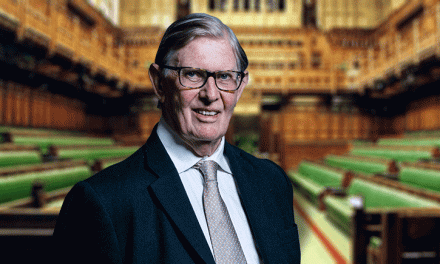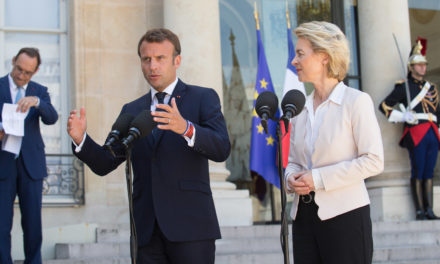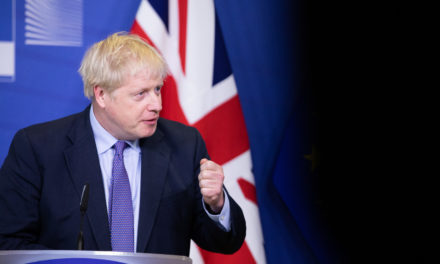An in depth analysis by THE EUROPEAN FOUNDATION of the foundations of Russian-German relations as far back as 2001, which provides in hindsight, an enlightening understanding of the present political crisis between Russia, Germany and the EU.
January/February 2001
The Journal of the European Foundation
EMU, Gold and the New Economy
Bill Cash, MP • Marc Glendening • Prof. Dr Wilhelm Nölling Allister Heath • Dr Charles Tannock, MEP • Henri Lepage Iain Duncan Smith, MP • John Tate • Sheldon Richman Peter Oborne • Allan Lloyd • Austin Mitchell, MPKeith Marsden • John Kissin • Dr Lee Rotherham
The European Foundation 61 Pall Mall, London SW1Y 5HZwww.europeanfoundation.org Chairman: William Cash, MP
Volume 8 Number 3 £2.50
Extending eastwards – the German answer to the German question
As The Times pointed out on 24 January, the European Foundation has been one of the the few organisations to address the issue of Anglo–German relations in the context of the European Union. I devoted two chapters to the German question in my first book Against a Federal Europe in 1990. I followed this through with two pamphlets on the matter,German and British National Interests and Response to Chancellor Kohl (all three publications are available from the European Foundation) and have raised the issue many times in the House of Commons.
Ever since the Soviet-German treaty of 1990, the balance of power in Eastern and Central Europe has gradually been shifting Germany’s way. In the dying days of the old USSR, on 9 November 1990, Mikhail Gorbachev and Helmut Kohl signed a bilateral treaty of friendship and co-operation between their two countries. The document makes fascinating reading. It contains in particular an annex detailing the planned develop- ment of a framework for economic, industrial, commercial, environmental, scientific and technical co-operation.
The Treaty remains surprisingly contemporary. I have been watching the developments in German–Russian relations for many years now and the situation is coming to a head, with grave implications for the future geopolitical stability of Europe. To understand way this is the case, it is necessary to realise just how bad the economic and political situation is in Russia today.
Latest estimates put Russia’s economic growth for 2000 at 7% and government spending up by 28%, excluding interest repayments. The economy is slowing, with industrial output down in both November and December and will probably see another decline in January. This is confirmed by a recent surge in unemployment. Deregulation proposals have been shelved, housing has not been reformed, government expenditures have not been cut and inflation is on the rise.
This means that it is virtually impossible for Russia to repay its huge public debts. It owes Paris Club lenders around £32 billion, 40% of which is owed to Germany alone. According to the World Bank’s Global Development Finance 2000, Germany also has a sizeable stake in Russia’s total $183.6 billion foreign debt. Russia’s foreign creditors and hence especially Germany therefore exert a huge amount of influence in Mos- cow. At the same time, the lenders do not want Russia to default unilaterally, because they would lose much of their money.
There has thus been much negotiating, especially between Russia and Germany. Russia signed a debt rescheduling agreement in Berlin on 26 July 2000, which implements an earlier multilateral agreement that was reached in Paris in August 1999. The July agreement was accompanied by a series of contracts on export credit guarantees provided by a German state-owned export credit agency, Hermes. More recently, Werner Müller, Germany’s economic minister, met his Russian counterpart in Berlin on 12 December 2000. It was reported a the time that they had agreed “in principle” to convert about $14 billion of German-owned Russian debt into equity in Russian companies. One possibility under discussion is that German firms would increase their stake into Russia’s giant energy conglomerate Gazprom (Ruhrgas presently owns 4% of the Russian firm.)
Given the corporatist and monopolistic nature of much of the Russian economy, large stakes in some such key companies would dramatically increase Berlin’s influence over Moscow. German companies would gain access to the most recent Russian blueprints, intellectual property and technology, which Russian firms don’t have the capital or economic capacity to develop. Additionally, Russian natural gas exports already account for 35% of Germany’s total annual consumption, thus further increasing Russian economic dependence on that country. The ghost of Willy Brandt and Ostpolitik is deep in the Social-Democrat psyche.
There are other – albeit closely related – reasons for this rapprochement between Russia and Germany. Vladimir Putin is a Russian nationalist who bitterly resents being dependent on America and what he perceives as US-dominated bodies such as the IMF or the World Bank. He resents the fact that America didn’t wipe out the Soviet Union’s debt after the dissolution of that empire (the debt was instead passed on to Russia). He has the choice between building an alliance either with China or with Europe. There is an ultimately insurmountable problem with China. Many senior figures in the Russian intelligence services and armed forces believe that the Eastern giant has long-term plans to take over large parts of Russian territory. Europe is therefore the only practical option, and Germany the increasingly dominant power in the EU. This will be even more so following Eastern enlargement, thanks to massive invest- ments in the area, as I detail below. Mr Putin has therefore turned to Germany. This is because from Russia’s perspective, the EU’s plans for a “rapid reaction force” – and therefore Germany’s plans, as the two are basically one and the same – entailing the emasculation and eventual abolition of NATO seem obviously against America’s national interest. Helping Germany, Mr Putin probably believes, could thus eventually help Russia by strengthening the EU and hence leading to American withdrawal from Europe.
This is confirmed by the reported recent redeployment of tactical nuclear weapons in the Russian enclave of Kalingrad on the Baltic Sea. The move had been mooted for a long time as a response to NATO’s planned eastward expansion and in particular the possibility of Estonia, Latvia and Lithuania joining the alliance. It is important to realise that the return of nuclear weapons to Eastern Europe would be an anti-American move rather than an anti-EU policy. The situation is complicated by other reports that Russia is prepared to cede Kalingrad to Germany – the first change of European borders since 1945, with the exception of the Balkans.



